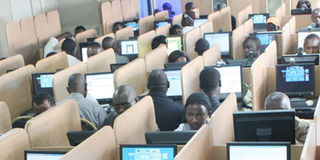Wanted: More experts to deal with cyber-crime

PHOTO | JENNIFER MUIRURI | FILE A cyber cafe in Nairobi. Cyber-security has become a major problem in industry as more companies open up to diverse kinds of information and communication technologies.
What you need to know:
- The field of cyber security is constantly expanding, with more domains to secure and more attacks to defend against. Intruders and attackers have become stealthier.
Cyber-security has become a major problem in industry as more companies open up to diverse kinds of information and communication technologies.
The Internet is particularly vulnerable. The invasion by cyber-criminals has created the need to guard organisational systems against diverse forms of cyber-attacks.
For instance, in the last days of July, the website of the Central Bank of Kenya was hacked into by people claiming to be from Gaza. The hackers blocked the banking regulator’s content from being accessed. Many high profile websites have had similar experiences in the past, including that of the Kenya Police.
These happen amid reports of a short supply of cyber security professionals. And it is not just a Kenyan weakness.
A report by Britain’s National Audit Office released in February shows that the current supply of security educated graduates and practitioners falls short of demand, and that it could take up to 20 years to fill the skills gap. The available demand is pulling talent out of the ranks of professionals who would be educating the next generation and conducting research into cybercrime.
“There is a need to be abreast with the latest technology trends in information assurance and cyber security,” offers Sidiki Traore, who is president of a learning institution called Distance Education for Africa (DeAfrica). “Computer security has become critical globally. It is time for Africa to pay attention to this area,” he stresses.
Based in Nairobi, DeAfrica has recently announced short courses focusing on the latest trends in cyber security and information assurance areas. The e-seminars to be held in August and September are expected to benefit a wide range of people dealing with IT security. Those targeted include software engineers, computer scientists, cybercrime investigators, network administrators, digital forensics experts and information security specialist.
The field of cyber security is constantly expanding, with more domains to secure and more attacks to defend against. Intruders and attackers have become stealthier.
And as mobile devices become warehouses for information about people’s daily lives, adds Traore, they have become more crucial as evidentiary devices in civil and criminal investigations, and thus need to be protected from hackers.
Cloud computing is also expanding. According to a Gartner report (2010), the cloud computing market is expected to explode to $148.8 billion in 2014, up from about $68.3 billion in 2010.
The rising affinity towards cloud computing is creating numerous challenges for cyber forensics professionals.
Traditionally, digital forensics professionals operate in a domain where system components are within physical reach and ownership boundaries are well defined.
In such a case, a forensic analyst works directly for an organisation and has access to the organisation’s computing infrastructure. With cloud computing, things have changed.



